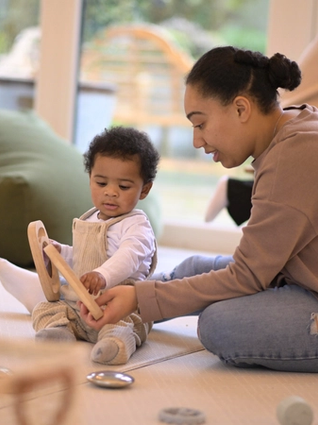
- Home
- Advice Hub
- Baby
- Bonding & Development
- Which Language Should We Use With Our Baby?
We’re Bilingual - Which language should we use with our baby?
This guide aims to empower those who are about to embark on their bilingual or multilingual parenting journey, providing insights and tips to help them navigate this and support their child.
As expectant parents, the excitement of welcoming a baby into the family is often accompanied by a myriad of questions and decisions. Almost 40% of adults living in the UK are bilingual (speaking two languages) or multilingual (speaking more than two languages) and one of the biggest decisions for some bilingual families is which language to speak with their baby.
In a world where bilingualism is increasingly common and celebrated, the choice can feel both significant and daunting. This guide aims to empower those who are about to embark on their bilingual or multilingual parenting journey, providing insights and tips to help them navigate this and support their child.
Which language should you use with your baby?
The first question many bilingual parents grapple with is which language to choose to speak with their baby. This might be a decision between more than one language already used in the family, or perhaps using the dominant language spoken in the community.
The answer lies in embracing your linguistic strengths and creating an environment rich in language exposure. Research suggests that speaking in your most proficient language fosters better communication and language development. As a parent, you serve as the primary language role model for your child, so it's crucial to offer high-quality interactions. Giving rich language learning opportunities in your home language or mother tongue can also lay the foundation for your child speaking English in the future. It is perfectly fine to speak more than one language if you're proficient in them. “Code-switching” (the seamless transition between languages) is a normal part of bilingual communication and supports linguistic flexibility.
What are the benefits of raising a bilingual child?
Despite what some people believe, being bilingual does not cause speech and language difficulties. Instead, it bestows a multitude of benefits upon children. Bilingual children often exhibit enhanced cognitive abilities, including better problem-solving skills and increased creativity. Academic achievement is another notable advantage, with bilingualism linked to improved performance in both literacy and numeracy.
Furthermore, bilingualism fosters a strong sense of cultural identity, instilling in children a deep appreciation for their heritage. Supporting your child to learn your home language will give them the opportunity to communicate with a member of your family or community who only speaks that language.
Getting started
Embarking on the journey of bilingual parenting may feel overwhelming, but there are numerous ways to cultivate a bilingual environment for your child:
- Create opportunities for language exposure – Seek out opportunities for your child to interact with others who speak your language. Whether it's through playgroups, cultural events, or family gatherings, exposure to other native speakers will support your child’s bilingual language development.
- Incorporate your home language into daily activities – Speak your language throughout your daily routines. Sing songs, tell stories, and read books in your home language to nurture your child’s love for language from an early age.
- Foster pride in bilingualism – Celebrate your child's linguistic abilities and encourage pride in their bilingual identity. Teach them the names of the languages they speak, emphasising the value of multilingualism. Speak your home language outside of your home, during outings to the park, shops and or visits to friends and relatives.
By embracing your linguistic heritage and creating an environment rich in language exposure, you pave the way for your child to become a confident and proficient bilingual communicator. Here's to nurturing bilingual brilliance in the next generation!
Advice & tips

Want to read more? Join the HiPP BabyClub for full access to this article.
As a BabyClub member, you'll get access to a range of exclusive benefits, including:
Monthly competitions
Discounts from our Partners
Expert advice tailored to your little one's age
Weaning recipes
HiPP shop discounts*
*10% off HiPP's online shop does not apply to our First Infant, Anti-Reflux or Comfort Formula Milk.
Important notice: Breastfeeding is best. Follow on milk should only be used as part of a mixed diet from 6 months. Talk to a healthcare professional.




